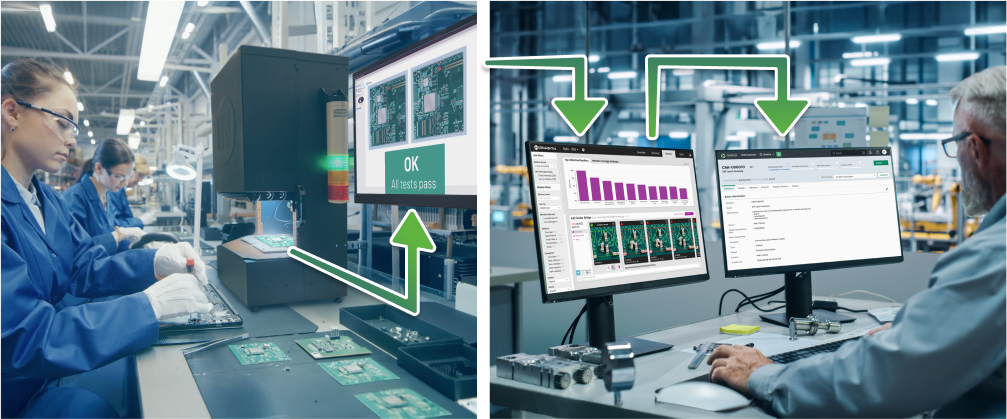From Quality Management to Quality Optimization in the Electronics Industry
Balancing Speed, Quality, and Margins: A Proactive Approach for Electronic OEMs
Speed and profit margins: these are the key priorities for most electronic OEMs. But achieving both typically means striking a balance between quality, cost, and the schedule—creating tension between engineers and operations teams prioritizing different metrics.
Typically, OEMs prioritize growth, while Quality gets blamed when something critical goes wrong. Optimizing for speed and growth creates a reactive quality management culture. However, leading manufacturers have begun to adopt a more proactive approach to quality. When Quality is involved from the beginning and empowered with as-built data, issues can be detected and fixed earlier, resulting in increased program speed, improved quality, and higher margins.
LEVERAGING AI AND WORKFLOWS FOR DEFECT DETECTION AND FASTER RAMP-UP
Companies can achieve these gains by combining powerful AI to proactively identify defects through the analysis of terabytes of data with prestructured workflows that help engineers implement appropriate corrective actions. This one-two punch catches defects early in your builds and accelerates ramp-up from new production introduction (NPI) to mass production (MP).
Arena has partnered with Instrumental, the leading manufacturing AI and data platform, to deliver an orchestrated solution in which operations, engineering, and quality teams can work together to proactively find and address quality issues.
Streamlining Defect Detection and Collaboration With Arena and Instrumental Integration
Even for the most controlled processes, novel defects occur during production—especially during ramp-up. Finding them can be hard. Human operators are unreliable at discovering new defect modes outside of their inspection protocols. As impacted devices begin to fail tests, engineers are rushed to the line to figure out what happened. The new defect is identified and if it’s severe enough to warrant the cycle time hit, the standard inspection procedure (SIP) is updated so that operators include it in future inspections. The cost of this process can be significant–failure analysis can take weeks, not including travel costs, opportunity costs, and wasted material and parts.
STREAMLINED DEFECT VERIFICATION WITH DISCOVER AI-ARENA INTEGRATION
Instrumental’s Discover AI automatically learns what typical units look like and proactively identifies outliers. Engineers can review the discoveries and confirm (or reject) the real defects–enabling Discover AI to learn and improve over time.
By integrating Discover AI with Arena, new defect discoveries can be assigned to a specific team for investigation. This streamlines new defect verification by highlighting possible defects for the engineer specializing in the relevant parts, components, and assemblies.
In the animation below, we see Instrumental Discover AI has identified two potential defects for a ZIF connector—contamination and misalignment of the mating flex. In just a few clicks, we can create a new assignment in Arena and assign it to our teammate Nic for review.
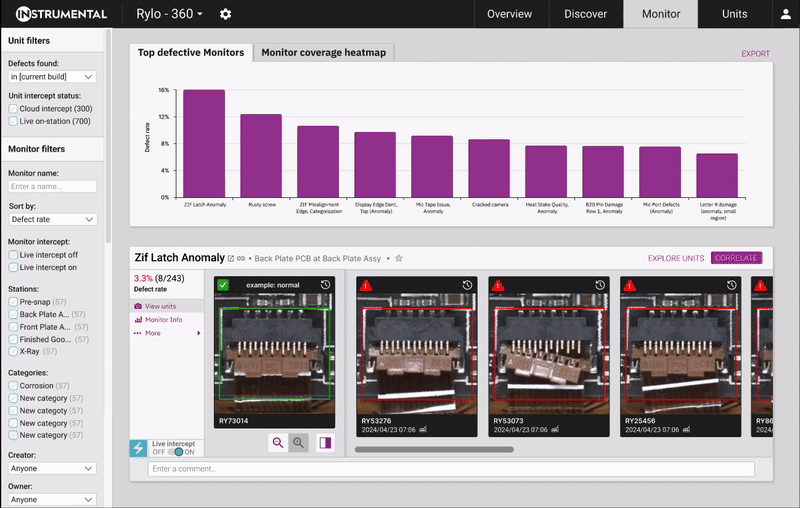
With this workflow, it’s easy to start a Quality resolution process in Arena after the very first failure, enabling faster resolution with less scrap and schedule disruption.
EXPORT DEFECTIVE UNIT DATA TO ARENA—QUICKLY CREATE CONTEXT-RICH CORRECTIVE ACTION REPORTS
Continuing with the previous example, once the anomalies around the ZIF connector were identified, the engineer in charge will want to ensure units with similar defects are intercepted on the line and routed for rework. This can easily be accomplished in Instrumental by creating a monitor, or visual test. Monitors are powerful AI-models that users can train within a minute to identify specific defect modes.
In this example, we’ve created a monitor to detect misaligned flexes entering the ZIF connector. In just a few clicks, we can export the data associated with this group of failures into a corrective action report.
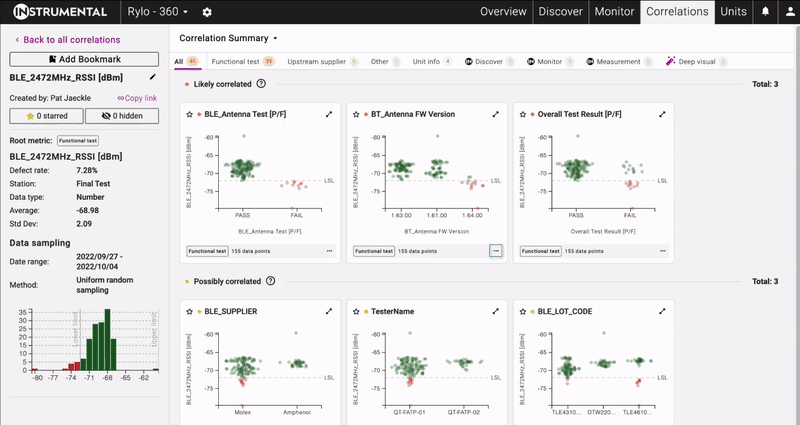
Monitors make creating corrective requests easier and faster by reducing the need for manual input.
ENRICHING NONCONFORMANCES WITH AI CORRELATIONS TO ACCELERATE FAILURE ANALYSIS
When addressing nonconformances, engineers must identify the underlying problem. Arena offers powerful root-cause analysis workflows out of the box (fishbone diagram, 8D, 5 Whys, etc.), which can now be augmented using Instrumental’s Solve AI. Solve AI highlights strong data correlations and can even run powerful deep-visual correlations, identifying visual variations highly correlated to the failures you’re investigating.
In this example, within seconds, Instrumental crunched a massive amount of data to identify that units failing Bluetooth tests tend to have firmware V1.64 installed. This result can be exported to the corresponding failure analysis corrective action report (FACA).
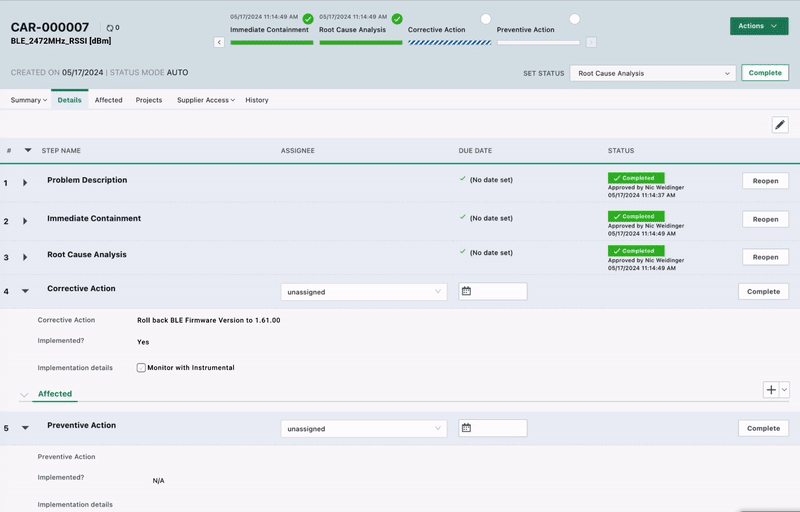
CORRECTIVE ACTION TRACKING—EFFECTIVENESS OF A CORRECTIVE ACTION OVER TIME
When a corrective action is implemented, users can simply check a box in Arena to track the impact on yield on the manufacturing line.
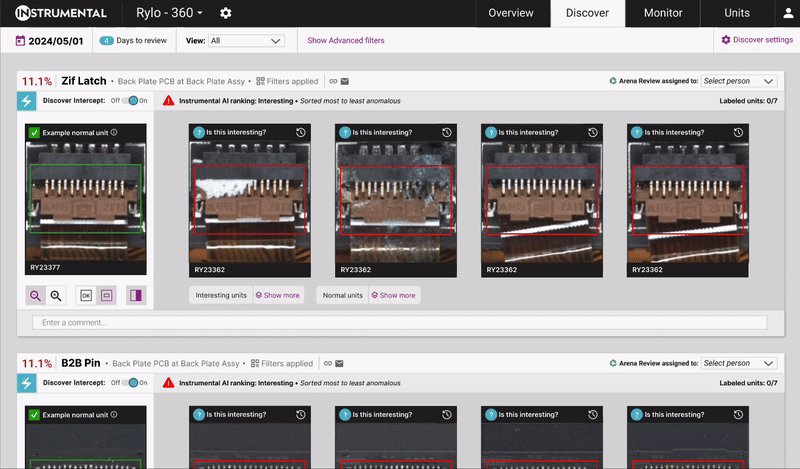
Benefits: Boosting Quality, Yield, and Growth
Improving quality and increasing yields are essential for electronic OEMs looking to increase margins and accelerate growth. With Arena and Instrumental connected, you can do both—improving yield to improve margins and accelerating growth by eliminating data aggregation and cleaning tasks from your failure analysis. With seamless data flows, you’ll proactively identify novel defects and fast-track issues for resolution.
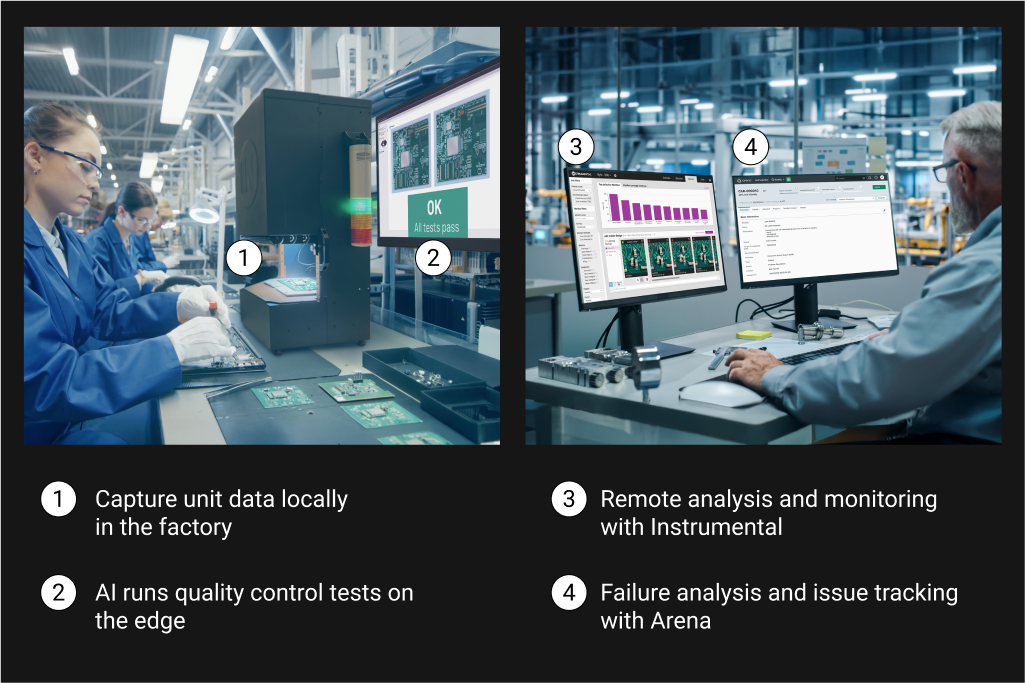
Together, we empower manufacturers to produce faster and better, resulting in happier customers and improved brand value.
If you’re interested in learning more, please contact your Arena account manager or request a demo of Instrumental.



